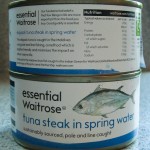We all know that fish stocks are declining, but we are told that we should eat two portions of fish per week, and most of us indulge in the (hopefully) occasional fish and chip supper – so are our food habits compatible with living an ethical lifestyle? In the second post trying to unravel the tangle that is the topic of sustainable fish I examine whether cod and haddock are OK to eat with a clear conscience.
Let’s deal with the easy bit first – unless you know where you local chippy is sourcing its fish from then, I am afraid, that the answer is a definite no. I believe that there are fish and chip shops that do advertise the origin of their fish – but none of these are in Daventry. If you can’t live without your take away, then I would suggest that haddock is a better choice than cod, but your conscience will still find you.
And so to the sustainability of cod and haddock. Stocks of both have been overfished and in many areas continue to be so. According to Greenpeace, most cod fisheries in the Northeast Atlantic are in poor condition, except for Iceland and the Barents Sea where there is better management. All stocks are however, ‘overfished or at risk of being unsustainably harvested’. Haddock has had a similar history, but there is a little more hope. Northwest Atlantic stocks were overfished in US waters until the middle of the 1990s, but since then there has been some recovery. Scientists now believe that some North Sea stocks can be fished sustainably, whilst West of Ireland and Icelandic fisheries need better management. They are also recommending the closure of the fisheries of the West of Scotland. A further complication arises from the fact that cod are also caught when fishing for haddock.
So, it would seem that maybe you can eat an occasional piece of cod or haddock with a clear conscience, but, as ever, it comes with a caveat. It also matters how your fish is caught. In common with lots of fish that live near the sea bed, a lot of cod and haddock is caught by bottom trawling. Not only does trawling result in a large bycatch (typically 30% of the catch by weight is thrown back dead or dying – these are mammals, juvenile fish, turtles and sharks) but it also damages the sea bed. Instead Greenpeace are recommending buying only line-caught fish – this is a more selective fishing method without the associated bycatch and the degradation of the seabed.
According to Greenpeace Atlantic cod and haddock should both be avoided unless the cod is from Waitrose or Marks and Spencer or is line caught or the haddock is Icelandic line caught. But wait a minute, didn’t the scientists say that the Icelandic haddock fisheries need better management – they certainly did, and that all stocks are at risk from overfishing? Does this help – I am not sure. What makes Waitrose and M&S fish so special? A look at Waitrose’s website and my local branch’s fish counter shows that the haddock and cod is indeed Icelandic and line caught, and this includes their prepacked breaded range. M&S’s website leaves me with more questions than answers though. Although M&S now source their cod and haddock from Iceland, their website states that the fish is air-freighted in – how is that sustainable? Their cod is line caught, but, apparently the haddock is trawled or line-caught, and smaller haddock are caught from the west coast of Scotland. This seems to go against the Greenpeace guidelines – maybe they just need to update their website? I hope so – as it makes me start to question the validity of Greenpeace’s advice.
My take on cod and haddock? Both are under pressure, fishing methods need to be changed to reduce the amount taken from the sea, and, we have to pay a little more, eat and waste a lot less and hopefully fish stocks may recover. Will I eat cod and haddock again? Probably, in the future, eventually, but I don’t need to eat fish more than every other month and I will insist on it being line caught. In the meantime I will stick to my pole and line caught, Waitrose own brand, tinned tuna.

